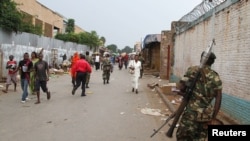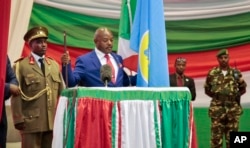European Union foreign ministers say they are prepared to increase economic sanctions on Burundi which has been in a political crisis since July when President Pierre Nkurunziza won a third term.
The EU ministers meeting in Brussels Monday said the European Union stands ready to impose sanctions against those in Burundi who have contributed to the country's violence as well as those who have hampered a political solution.
However, the EU ministers said they would not suspend humanitarian aid to Burundi.
Last year, the European Union imposed travel bans and asset freezes on four officials close to President Nkurunziza.
Violence in Burundi began last April when President Nkurunziza announced he would run for a third term in office. Clashes between police and protesters and series of attacks in the capital, Bujumbura, have killed more than 400 people and sent hundreds of thousands fleeing the country.
President Nkurunziza was re-elected last July in a poll boycotted by the opposition. His critics say he violated two-term limits in the constitution and the Arusha agreement that ended Burundi's civil war. The president said his first term didn't count against the limit because he was elected by parliament instead of a popular vote.
The African Union has proposed deploying peacekeepers to Burundi, but President Nkurunziza has refused to accept them, saying Burundi would fight them as invaders.
In December, the European Union invited Burundian officials to Brussels for formal talks to try to find a political solution to the crisis.
"Despite all the efforts of the international community, the situation in Burundi remains deadlocked," EU foreign ministers said in a statement Monday.
Some material for this report came from AP, AFP and Reuters.






